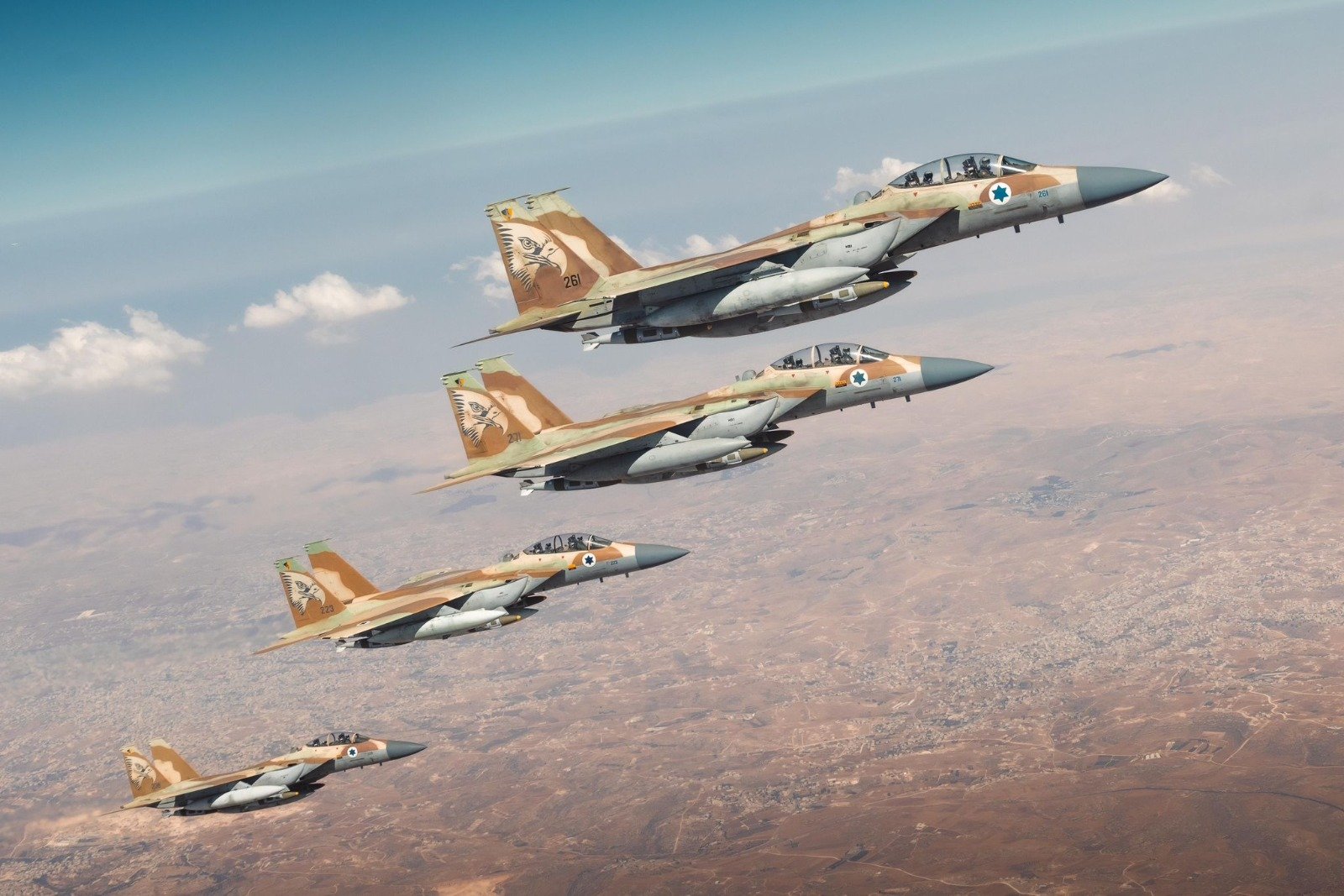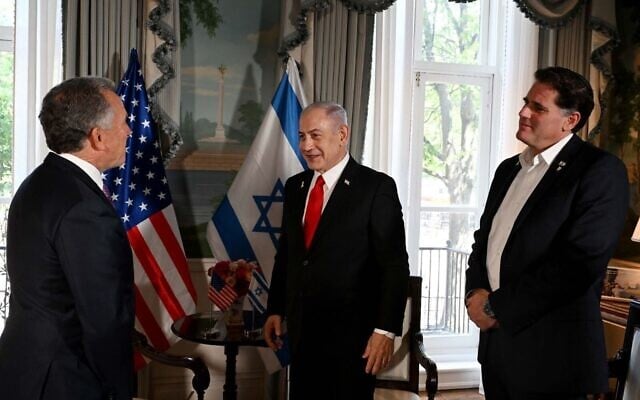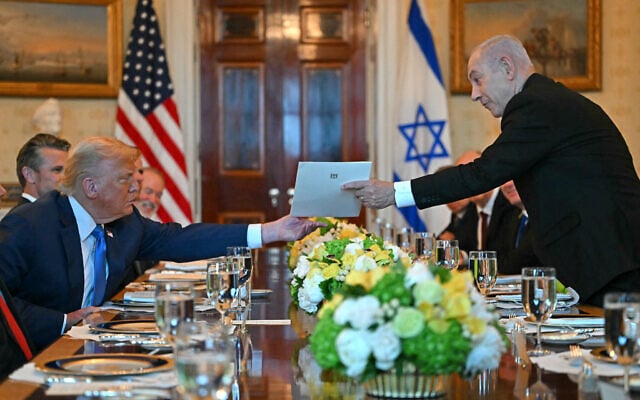



Israel anticipates the United States will permit it to launch new strikes on Iran in the event that the Islamic Republic attempts to restart its nuclear program, and Jerusalem is preparing for that possibility, a report said Monday.
Later, as US President Donald Trump and Prime Minister Benjamin Netanyahu sat down for a dinner in the White House, both men praised the Israeli and American strikes on Iran’s nuclear program last month, saying the campaign was a success, though they acknowledged the possibility that hostilities could restart if Iran does not want to keep the peace.
Axios, citing two sources, reported before the Trump-Netanyahu meeting that Strategic Affairs Minister Ron Dermer had told officials after meetings in Washington last week that he thinks the White House would support new Israeli strikes under certain circumstances.
Those circumstances include an attempt by Tehran to rebuild its nuclear program, or to extract the existing highly enriched uranium it is believed to have stored in underground facilities that the US bombed last month.
The US used massive bunker-buster munitions to target the three key nuclear sites in Iran’s Natanz, Isfahan and Fordo. Then, Washington brokered a ceasefire ending the 12-day war between Israel and Iran.
An estimated 400 kilograms (882 pounds) of 60-percent-enriched uranium — a short step away from weapons-grade — is believed to have been stored in the underground sites, and both experts and Israeli officials have said that it may have been moved prior to the US bombardment. The White House has rejected that assessment, saying the uranium was buried in the strikes.
Dermer, who declined to comment on the Axios report, met last week with US Vice President JD Vance, US Secretary of State Marco Rubio, and US envoy to the Mideast Steve Witkoff, Israeli officials told the news outlet.
After those meetings, the Netanyahu confidant reportedly told Israeli officials that the US is committed to a zero-enrichment policy for Iran.
Netanyahu and Dermer also met with Witkoff and Rubio on Monday, shortly before they sat down for a dinner in the White House with Trump.
Speaking to reporters as the top officials sat down for the dinner, Witkoff said the first round of nuclear talks between the US and Iran following the twelve-day war would take place “in the next week or so,” though neither he nor Trump gave a specific date or a location.
“We have scheduled Iran talks, and they want to talk,” Trump said, adding that Iran had taken a “big drubbing.”
Asked what the talks would be about moving forward, Trump acknowledged that he didn’t completely see a purpose for them, given his belief that Tehran’s nuclear program has been “obliterated,” an assertion he reiterated to reporters.
“But [the Iranians] requested a meeting, and I’m going to go to a meeting, and if we can put something down on paper, that will be fine,” he said.
Trump said the strike he ordered reminded him of the US dropping atomic bombs on Japan in World War II.
“I don’t want to say what it reminded me of, but if you go back a long time ago, it reminded people of a certain other event, and Harry Truman’s picture is now in the [White House] lobby,” he said, referring to the US president behind the strikes on Hiroshima and Nagasaki.
“That stopped a lot of fighting, and this stopped a lot of fighting,” Trump assessed.
He asserted that Iran was now in a different mindset regarding nuclear talks since the US strikes, and has gained a lot of respect for the US and Israel.
The US president said he hoped to remove sanctions on Iran “at the right time.”
“I’d like to see Iran build itself back up in a peaceful manner, and not going around saying ‘Death to America, Death to the USA, Death to Israel,’ as they were doing,” Trump says.id. “They were the bully of the Middle East, and now they’re not the bully anymore.”
Asked if the Israel-Iran war was over, Trump said: “I hope it’s over,” adding: “I think [the Iranians] want to make peace and I’m all for it. Now, if that’s not the case, we are ready, willing, and able. But I don’t think we’re going to have to be.”
Netanyahu, answering the same question, said the Israeli and US strikes last month “set back the two tumors that were threatening the life of Israel: The nuclear tumor and the ballistic missile tumor.”
“But when you remove a tumor, that doesn’t mean it can’t come back. You have to constantly monitor the situation to make sure there’s no attempt to bring it back,” he continued.
“I think part of the effort of consolidating this and ensuring that we don’t have to repeat this is to monitor this carefully,” the premier said, noting that he and the president “are talking about it.”
“I’d like to believe that Iran would not test our fortitude, because it would be a mistake,” Netanyahu added.
Israel began an air campaign in Iran on June 13. Jerusalem said the sweeping assault on Iran’s top military leaders, nuclear scientists, uranium enrichment sites, and ballistic missile program was necessary to prevent the Islamic Republic from realizing its declared plan to destroy the Jewish state. Over the course of the campaign, the list of targets widened, encompassing state television and the Iranian domestic security forces.
Iran responded to the Israeli attacks with near-daily barrages of missiles at cities, killing 28 people and wounding thousands, according to health officials and hospitals. Some of the missiles hit apartment buildings, a university, and a hospital, causing heavy damage.
Times of Israel staff contributed to this report.


